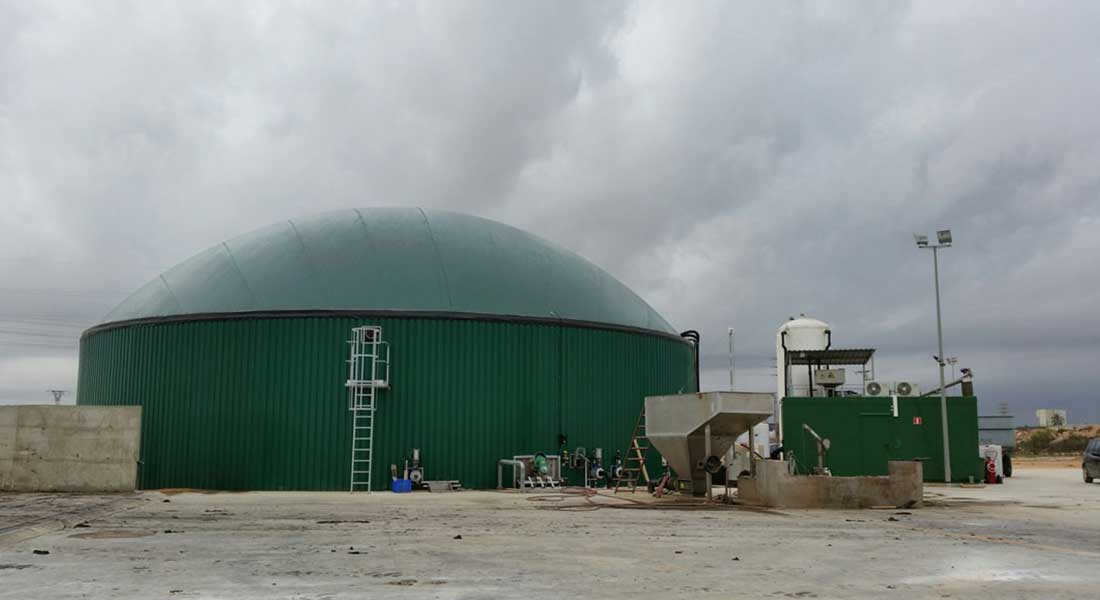HRS Helps Spanish Grower Become Energy Self-Sufficient
Challenge
Driven by austerity measures, at the beginning of 2012 the Spanish government effectively withdrew subsidies for renewable energy, including biogas production. Despite this freeze on support, there are still opportunities for businesses to maximise the value of energy and digestate. So how does a farming company like Kernel Export, which produces salads, brassicas, melons, herbs and courgettes and pumpkins and exports throughout Europe, answer these market challenges and meet high crop safety standards, while complying with local legal requirements and fulfilling the expectations of overseas fresh produce markets?

How the DCS system works
Using a multi-effect concentration and forced recirculation, the DCS takes the liquid digestate, which has a low dry solid content, and increases the dry matter from between 2.4-4% to 9-15%. This means less storage is required and fewer operations are needed to transport and spread it.
The DCS uses HRS’s corrugated tube-in-tube heat transfer technology, and uses a vacuum to superheat the digestate in a two effect concentrator. This design makes best use of the energy by reusing the low temperature steam produced by the evaporation process.
Solution
HRS installed its Digestate Concentration System (DCS) at a 400 kW anaerobic digestion plant at the company’s packing site in Murcia in November 2015. The plant was constructed by Ludan Renewable Energy. This was the first time a project of this type and scale had been attempted. The DCS technology:
- Turns by-products and crop waste from some of the 2,000 hectares the company farms into renewable electricity and agricultural fertiliser – called digestate.
- Ensures the processed digestate complies with local legislation, which prohibits unprocessed digestate being applied in Murcia, turning it into a biofertiliser.
- Generates an additional source of irrigation water by cleaning the water evaporated from the digestate, which is used on the farm’s salad and vegetable crops.
- Recovers fertiliser nutrients from both the concentrated digestate and from the evaporated water.
Results
Anaerobic digestion in Spain does not receive a Feed-in-Tariff. To make the project financially viable, the HRS DSC system:
- Processes over 50 tonnes of crop residues daily, producing a condensed, nutrient rich digestate, which in turn reduces storage and transport costs.
- Produces 50% of the energy needed to heat and power the site’s packing and storage facilities.
- Is estimated to be saving the plant more than 2,000 tonnes of CO2 each year, equal to the energy consumed by powering 200 homes.
- Further reduces running costs by cleverly integrating two heat sources to feed the evaporation plant. Using a CHP engine during daytime hours, biogas is used to produce electricity; at night a boiler heats the water.
Testimonies
“We had been looking for years for a system to optimise the use of the waste from salads and vegetables from our two production sites and we found the answer in a biogas plant to generate electricity and heat. This is then used to process the liquid and solid fraction after digestion to obtain a bio-compost that we can use in back on our production fields. The project has been a real challenge, as nothing similar had ever been built, with the focus on reusing and recycling salad and vegetable waste to return it back to the land for future production.”
Jose Antonio Cánovas Martínez, General Manager of Kernel Export
“We were very pleased to be a part of this project as we believe that the solutions chosen by Kernel will serve as an example to the agricultural industry in Spain, demonstrating how crop waste can be converted into energy and high quality fertiliser.”
Arnold Kleijn, HRS Head of Sales and Marketing